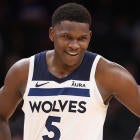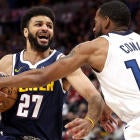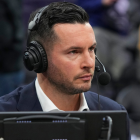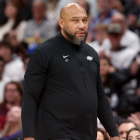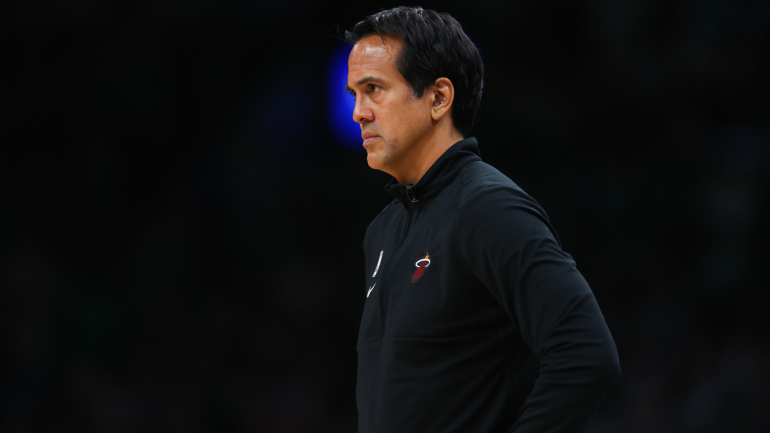
DENVER — He seemed to storm into the room, an edge in his eye, a tone to his voice that said to leave him alone. Never mind that this was a press conference to kick off the NBA Finals, Miami Heat head coach Erik Spoelstra seemed decidedly disinterested.
"We're not getting into any of that stuff," he spit out in response to the first question, about how Denver's altitude might impact his team. "Our guys are in great shape. They're ready to compete. If Denver wants to tip this thing off at the top of Everest, we'll do that."
After some praise for the Nuggets, but his fierceness remaining, it was time for question No. 2, about the fabled "Heat Culture." This went about as well as the first one.
"I think it's been defined enough," he said, still not thrilled. "I think you can just look at all the, whatever, thousand other articles about it. I don't think anybody wants to hear about it. It's something we believe in. It's for us. It's not for everybody."
Spoelstra wasn't having it. Not the questions. Not the scene. Not the hoopla. Not out of rudeness, or any kind of studied dismissiveness, or even anger, though you could be forgiven for thinking he was mad as hell. It was the intensity oozing off of him that was overshadowing everything — and painting a picture of a man ready for battle, not silly questions, nor anything else for that matter.
And why not? The intensity that has taken the Miami Heat to this improbable Finals appearance in many ways mirrors the intensity that has taken Erik Spoelstra to the edge of being one of the game's best coaches, ever — an equally improbable run for a man whose genius is finally being seen for what it is.
This is a guy who has never won an NBA Coach of the Year Award. He has never won an NBA championship without LeBron James on his roster. He is the man tapped years ago to carry on Pat Riley's "Heat Way" by Riley himself, an honor that also comes with a feeling that this is Riley's culture, Riley's team, Riley's successes.
Add all that up and you get a grossly under-heralded head coach, one who was still talking.
"This is a special group," he said. "This group has been able to overcome a lot of different things, handle a lot of adversity, setbacks, things that have not gone the way we wanted it to go. Instead of having that collapse our spirit, it allowed us to develop some fortitude and grit collectively and give us something to rally around, which was each other."
Grit. Fortitude. Handling adversity. Dealing with setbacks. And, unspoken but real, doubts every step of the way during these playoffs that they belonged, that they would advance, that this run was legitimate. An eighth seed that almost wasn't even that, one no one saw coming, one that couldn't even be seen for the contenders they were as they won series after series and game after game.
Sounds a lot like Spoelstra himself.
So this Finals, against a formidable and heavily-favored Nuggets team, is a chance to prove and showcase what is already so: That Erik Spoelstra is one of the game's all-time greatest coaches.
It's a wonder he's here at all. He started his career in the video room, a brutal climb in any organization, but certainly under Riley, a taskmaster who would have made those hours endless and brutal. Those odds, like those for this Heat team, were impossibly long. Yet here they both are.
Even Spoelstra's big break, stepping in for Riley, was also a test-case in filling almost impossibly large shoes — the kind of pressure that breaks many capable people.
And then there's the fact many teams would have fired Spoelstra way back in 2010.
That was the year — and credit Riley here, too — when, after a disastrous 9-8 start with the fabled "Big Three" of LeBron James, Dwyane Wade and Chris Bosh, Spoelstra faced a revolt from James himself, who at the time wanted the coach out.
I covered that Heat team then, and at the time LeBron went far enough to plant a story with a then-ESPN reporter letting it be known Spoelstra was a problem and LeBron was not happy.
Most people wouldn't have survived that. Spoelstra did, and has thrived ever since.
Yet his path all these years, successful though it has been, has not led to a championship since James returned to Cleveland in 2014. Since then, the Warriors have become a dynasty, and guys like Nick Nurse and Mike Budenholzer and Frank Vogel and Tyronn Lou have won NBA championships. And Spoelstra has just kept on doing what he's always done: grinding, throwing himself into the game, staying under the radar, great but rarely celebrated, appreciated in Miami but overlooked elsewhere.
So you could understand how the casual NBA fan has missed Spo's genius. Even the decidedly not-casual NBA person sometimes misses it.
"Erik Spoelstra is one of the top two or three coaches in this league," ESPN's Jorge Sedano said, off-handedly, on a summer league broadcast back in 2019.
"Wait a second!" Dan Dakich responded.
"That's not even debatable," Sedano said.
"Oh that's so debatable. You can say it as sternly as you want …"
And on it went, the usual polite "he's-good-but-not-great" logic that has seemed to follow Spoelstra from one success to another. Then, a bit later, from Dakich: "If you're gonna tell me Erik Spoelstra is one of the two or three (top) coaches and it's not debatable, I'd simply say you're out of your mind. I don't think he's in the top 10."
This is common, for so many who don't see Spoelstra for what he is. But even the doubters will have to see the Heat coach clearly if he can complete this improbable, insane run for a Heat team he has guided to the doorstep of an unforeseeable, stunning championship run.
Yet the argument that Spo's role in those two titles should be reduced to the talent he coached misses the pattern of success for other all-time great coaches. Gregg Popovich had Tim Duncan for every one of his championships. Phil Jackson had Jordan and Pippen, and Shaq and Kobe, and then Kobe. Steve Kerr coached Stephen Curry, Klay Thompson, Draymond Green and Kevin Durant. And so on.
Great coaches must coach star-studded rosters. Stars win championships. Those are the rules. And that — with all respect to the Heat — is part of the glory of what Spolestra in doing this postseason, coaching Jimmy Butler, seven undrafted players and worth-but-past-their-prime veterans to this place.
Yet Spoelstra's resume resonates beyond those titles, and even this run. He has been a model of consistency, ringing, always, more than most, or any other, coaches would have. There is the Finals appearance in 2020, an accomplishment many attempt to downgrade because it was in the bubble. There is last year's Heat team, which won the East in the regular season and took the Boston Celtics to seven games in the Eastern Conference Finals. There are less shiny but equally impressive coaching performances over the years.
And now there is this amazing, amazing run, one Las Vegas put at 150-1 to complete when the playoffs began. One they're four wins away from pulling off. One no one — myself included, I must admit — believes they can actually finish off.
Before the Heat perhaps prove as all wrong again, though, there was Wednesday's press conference, and the game's best and most under-appreciated coach talking about his team.
"It's those moments when nobody else understands," Spoelstra was saying Wednesday. "Nobody else is in the locker room. Nobody else -- we say that all the time, our guys are the men in the arena. It's tough to explain it to people on the outside."
Spoelstra kept going, his message, for those who have followed his story, striking a very specific chord.
"But when you have these privileges to be able to go through adversity or setbacks and learn from that, I think those are lessons that we all could benefit from," he said. "You develop a grit and a collective perseverance and fortitude. If you approach it the right way, which this group does, you can really grow. They can be incredible life experiences, to be able to come together like that."
He was talking about his team, the players, "the men in the arena." But he could have been talking about himself, about his own journey, and about this chance to turn his coaching greatness into the most unlikely NBA championship run in the sport's history.














